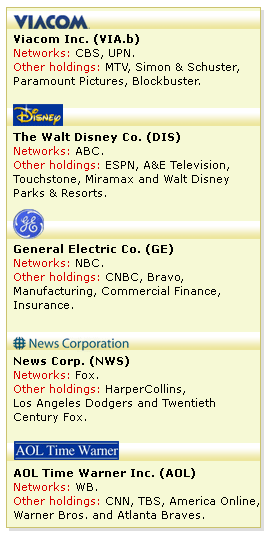NEW YORK (CNN/Money) -
Talk about big money and big politics. One of the most hotly contested decisions by regulators in recent years comes Monday when the Federal Communications Commission will issue new rules on media ownership in the United States.
The FCC is widely expected to vote 3-2, with the backing of Chairman Michael Powell, to relax decades-old rules and allow television networks to own more TV stations, among other changes.
The big media companies, including Viacom (VIA.B: Research, Estimates), owner of CBS and UPN, and News Corp. (NWS: Research, Estimates), which owns most of Fox and several newspapers, have been lobbying for the new rules.

Groups as diverse as the National Organization for Women and the National Rifle Association -- as well as both liberal and conservative media watchdog groups -- have been lining up against.
Some owners of smaller TV stations are also opposed to the new rules. (Click here for more).
The FCC has received so many public comments on its Web sites about the vote that it was having "problems" with its servers Friday, according to an agency official. (Click here for more).
Under the proposed rules, media companies could own enough television stations to reach as much as 45 percent of the national TV market, up from the current 35 percent.
Media companies would also be allowed to own TV stations and newspapers in all but the smallest markets, and in large markets, the companies could own several radio and TV stations. The changes could help Viacom, News Corp. and other network owners since their network operations usually break even at best while local stations can be highly profitable.
Powell has been pushing the proposals, saying the current rules from the 1960s and 1970s -- when three broadcast networks controlled most of what was seen on television -- are outdated. The proliferation of cable, satellite and the Internet have changed the landscape, he and many media executives argue.
But critics say the new rules will concentrate ownership of the nation's airwaves in even fewer hands, which could hurt the way people get their information, threatening one of the foundations of the world's most powerful democracy, diversity of information sources.
| 
| |

| 
| 
|

|
 The debate over easing the FCC's media ownership rules has focused on the media heavyweights, but there are smaller media companies just as dominant in their markets. Greg Clarkin reports. The debate over easing the FCC's media ownership rules has focused on the media heavyweights, but there are smaller media companies just as dominant in their markets. Greg Clarkin reports.
|
|
Play video
(Real or Windows Media)
|
| 
|

|
|
Other companies that stand to benefit from Monday's ruling: Walt Disney Co. (DIS: Research, Estimates), which owns ABC, General Electric Co. (GE: Research, Estimates), the owner of NBC, and AOL Time Warner Inc. (AOL: Research, Estimates), parent of CNN/Money, CNN and the upstart WB network.
One media veteran who opposes the changes is Ted Turner, a director and the largest individual shareholder of AOL Time Warner, who wrote an opinion piece in Friday's Washington Post saying he would not have been able to start his own media empire in 1970 if the proposed rule changes had been in effect then. (Click here for more).
In any event, legal experts say court challenges to the new rules are almost guaranteed if the FCC acts as expected. That means the ultimate arbiters of the new rules will be the courts, and possibly Congress, current and former FCC officials and media lawyers say. (Click here for more).

|

